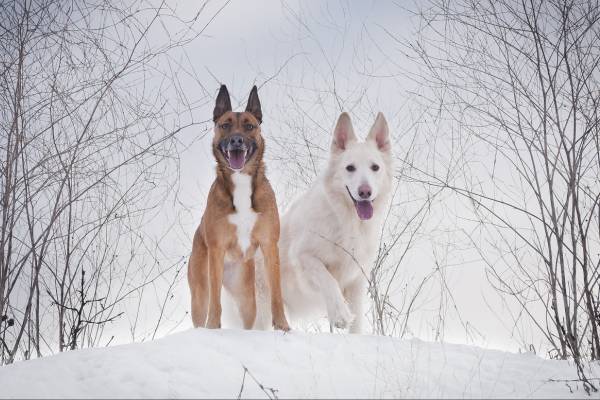When it comes to puppy development stages, there are six primary stages – the neonatal stage, which spans up to 2 weeks; then comes the transitional stage, which spans the 2nd to 4th weeks of their life; the next crucial stage is the socialization stage, which spans the 4th to 12th weeks of their life, followed by the juvenile stage that encompasses the 3rd to 6th months of their life. The adolescent stage covers the 6th to 18th months of their lives, and the young adult stage starts from the 18th week onwards. As a pet parent, you must understand these stages of their development and life to understand them better.
The Neo-Natal Stage (0 To 2 Weeks)
Regarding puppy development stages, this is the first one – the earliest phase of their lives. This starts from their birth and continues till they are two weeks old. This period is essential for their growth and development since they transition from entirely dependent on their mothers to slowly becoming more aware of what surrounds them. When puppies are born, they are deaf, blind, and unable to regulate their body temperature. At this stage, their primary focus is to stay warm and feed.
At this time of puppy stages by week, they depend wholly on their mother for nourishment and nursing. It is from her milk that they get the antibodies they need to bolster their immune systems. During this stage, most of their time is spent sleeping. They often huddle with their littermates or their mother for comfort and warmth. Thanks to their limited mobility, they can only crawl and tend to snuggle close to their littermates and mothers for security. The neonatal stage is also crucial in terms of their weight gain.
In this part of the puppy stages, they usually double their birth weight in the first week. As such, this particular phase is characterized by rapid growth. You must monitor their weight closely to understand how healthily they are developing. Despite the lack of development of some of their senses, puppies can taste and touch right from birth. This is what helps them find their mother for nursing and nourishment. As a caregiver, you have an essential role to play in this stage by ensuring that they and their moms are comfortable and safe.
This particular phase of puppy development stages can be regarded as an exciting period of their growth and development between the next stage and the end of earlier stages between 2 and 4 weeks of their lives. The most prominent characteristics of this phase are significant sensory and physical changes even as pups start to explore their environment and interact more with their surroundings. During the transitional stage, the milestones experienced by puppies are remarkable. Their senses of hearing and sight start to develop gradually.
This lets them perceive sound and light for the first time. This is the most critical phase in terms of puppy stages by week. In the initial stages, their vision is blurry, but they can still detect movement, and even as their eyesight matures, their ability to see light keeps improving. Even as their hearing becomes more acute, they start to respond more to sounds, including the vocalizations of their littermates, environmental noises, and noises emanating from humans. This newfound sensory awareness prompts them to be more curious and engage more with their surroundings.
In this part of the puppy stages, their mobility improves significantly! Despite having unsteady legs, they start to wobble around even as they try to explore their immediate areas by walking. This exploration helps to build a sense of coordination in them and makes their muscles stronger. This phase sets the foundation for the more coordinated movements that follow in the latter weeks. During the transitional stage, their baby teeth start to come out, and they start chewing to mouth and exploring their surroundings.
The Socialization Stage (4 To 12 Weeks)
This part of the puppy development stages usually encompasses the 4th to 12th weeks of their lives. This is a critical period as far as developing their behavior and mind is concerned. This stage introduces them to different experiences, animals, environments, situations, and people. This exposure shapes their social skills and responses for the rest of their lives. At this stage of their lives, puppies are immensely receptive to new experiences and stimuli. They also start to learn more about the world around them.
Such puppy stages by week help them form the impressions that influence how they behave when they grow up to be adults. They must have positive exposure to various sights, smells, sounds, and interactions to grow up confident and properly adjusted adults. If pups get socialized from an early stage in their lives, it helps them become accustomed to different situations. This means that the chance that they will be aggressive towards or afraid of people, environments, and animals they are not familiar with is reduced.
It also helps them become adaptable, thus making sure they are not as anxious in new situations as they would otherwise be. There are so many ways you can go about such exposure during such puppy stages. You can introduce them slowly to car rides, get them to meet people of various ages, take them on walks in other neighborhoods, and meet other dogs in controlled settings. This helps your pup become comfortable in a wide range of settings. Their positive interactions with other dogs teach them how to behave appropriately in society.
The Juvenile Stage (3 To 6 Months)
This part of the puppy development stage spans around the 3rd to 6th months of their lives. This is a significant period in terms of their growth and development. The main characteristics of this phase are the energetic, explorative, and curious nature, even as they continue to learn about their environment and develop physically and mentally. During the juvenile stage, puppies experience physical changes. They go through a period of rapid growth where their weight and size increase noticeably. This is also the phase when their teething period ends with permanent adult teeth emerging and replacing their baby teeth.
This period of puppy stages by week also improves muscle development even as they achieve greater movement coordination. Their energy levels surge appreciably, showing greater endurance and agility even as they revel in playful exploration and other activities. From a mental growth perspective, this stage is also crucial for their learning and socialization. Pups continue to fine-tune their social skills even as they interact with other animals and humans apart from their littermates. This phase is crucial in shaping their behavior, responses to different stimuli, and personality.
It would be best to focus more on basic obedience commands during these puppy stages while training them. Remember that they will be eager to learn all you teach at this stage as they will want to please you. This is why it is the ideal time to start teaching them basic commands such as sit, come, and stay, along with leash manners. Please know and understand that methods of positive reinforcement work best at these stages. It helps you encourage positive behavior and form a strong bond with them. It is essential to provide them with the proper nutrition at this stage.
The Adolescent Stage (6 To 18 Months)
These puppy development stages last from the 6th to the 18th months of their lives. Once again, this is a period where significant changes happen regarding their behavior and body. The phase of growth and exploration that they undergo in this stage of their lives mirrors that of human teenagers. This is why, at times, when they transition to adulthood, they behave in ways that can be challenging for you as a pet parent. Physically, adolescent pups continue to develop and grow, but the pace is much slower compared to the preceding months.
During these puppy stages, by week, they will reach the size they would be as adults even as their muscular and skeletal development is completed. However, their bodies might still be adjusting to that growth, and they occasionally appear clumsy. At times, their appearance might keep changing during this period! From a behavioral standpoint, they might demonstrate greater independence and a desire to be assertive. They might test boundaries, show greater excitability, occasional disobedience, and restlessness, and challenge your authority. At times, this could be because of hormonal changes.
In other cases, they may be doing so to affirm their place in the social hierarchy. These are all common characteristics of such puppy stages. These are also why you must reinforce and retrain them in the commands they learned during the jIt would be best if you were. It would be best if you were patient and consistent with your efforts. Emphasize positive reinforcement so that you can navigate their challenging behavior and reinforce how you want them to behave. Even in this phase, socialization is essential as you must continue exposing them to new situations and individuals.
Read Also: THE IMPORTANCE OF MONITORING YOUR PUPPY’S WEIGHT GROWTH
The Young Adult Stage (18 Months and Beyond)
These puppy development stages start from the 18th month of their lives and can go up to anywhere between the 2nd and 3rd years. This is the period when they mature and settle into adulthood. At this stage, they become more composed and more stable than their energetic adolescence, which may be tumultuous at times. There is little they need to develop physically at this stage as they have already reached their weight and size in the previous stage, and their bodies are developed in puppy stages; they have an adult appearance by week, with their muscle tone, coat, and overall physique showing that they have matured. Behaviorally, they show signs of maturity by being increasingly stable in terms of their temperament as opposed to their adolescence. They tend to show greater self-control, more emotional maturity, and lesser impulsivity. They often become more obedient and dependable at this stage and are better equipped to deal with different situations. The training efforts that you made when they were pups and adolescents start to bear fruit at this stage.
A properly trained young adult pup will be more reliable and consistent during such puppy stages. They become more receptive to commands and show a higher level of focus. Thus, it is an excellent time to reinforce all the training they have received earlier or engage in specialized activities such as obedience and agility competitions. This particular stage is preceded by introducing them to advanced skills. Socialization training still needs to continue at this stage, even though young adult dogs tend to be more discerning regarding their interactions. They may, at times, show stronger preferences for specific individuals.
Conclusion
Learning and understanding the various puppy development stages helps you understand the whys and what of your little one. This way, you can also take better care of these individuals who depend wholly on you and love you with all their might; however, if you want your pup to grow into a dog who garners love and respect from everyone, you need to be proactive in training and developing them! You need to pay attention to their growth. Remember that even as they grow old and mature, it helps you learn more about them and love them that much more.
 DogExpress
DogExpress






















 in Chandigarh, India.
in Chandigarh, India. 

